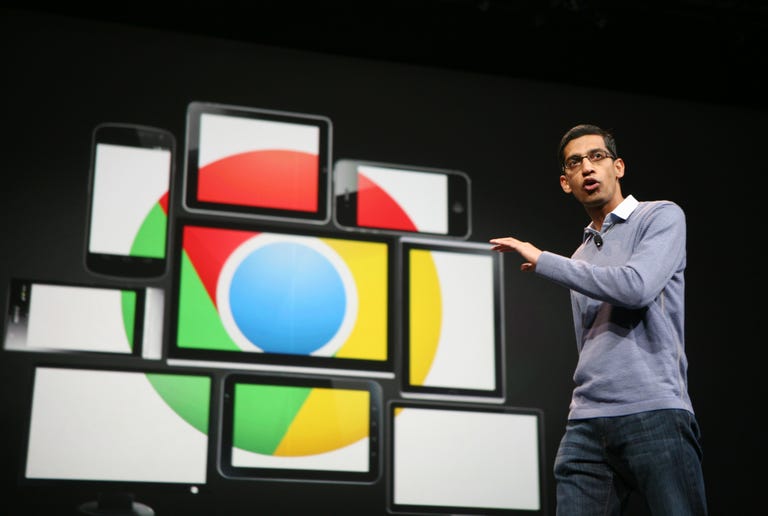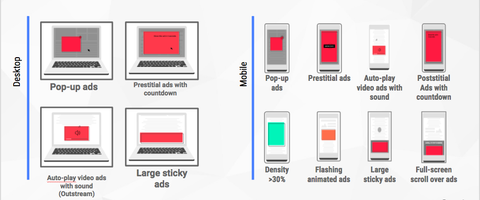Google's been busy this week. First came the new push to make email interactive. Then the flashy "Google Stories"—a Snapchat-esque package that can live in Google's search results. Most importantly, we're about to get Google's newest version of Chrome, which will block "annoying" ads by default.
At first glance these projects might not seem unrelated. If anything, they look like a public good. Google is flexing its muscle to make the core experiences of the open web—email, searching, and reading web pages—a cleaner, better, more user-friendly affair.
That may be true, but make no mistake about the other side of this coin. These projects are different facets of a push that will tighten Google's stranglehold on the web.
Google AMPs It Up
One of the keys to unlocking the underlying connection is the "Accelerated Mobile Pages Project," or AMP. An open-source project led by Google and announced in late 2015, AMP is a combination of technology and standards ostensibly designed to make web pages load faster on mobile devices.
By using some of AMP's special code and adhering to its guidelines, websites likes ours can make a version of a web pages that loads lighting-fast—as much as three times faster—with no improvement in the user's internet speed. On top of that, Google will rank such pages higher in mobile search results. People searching Google on their phones get faster web pages, and because quicker-loading sites get more eyeballs, publishers hustle to make their sites load quicker on mobile. Everybody wins!
Well, not exactly. AMP also has considerable downsides. These pages load quickly because of the restrictions they place on the websites that use them, including limited options for page design, and crucially, restrictions on the kinds of ads they can display. Such restrictions have already made life harder for publishers, who despite being at the top of Google's search, have trouble making any money from their AMP pages. It's a painful trade-off. There are ways to make a webpage faster without AMP and retain more of the revenue and control, but implementing AMP is the only way to guarantee that primo placement in Google search results.
That brings us back to Google's announcements. It so happens that both new tricks, making Gmail more interactive and putting snazzy moving Stories into search results, are both extensions of AMP. Google Stories in particular are eye-catching, engaging little nuggets that will undoubtedly attract attention at the top of Google search results. But, for the time being, they don't support ads at all. When they do, they will undoubtedly offer a limited variety of kinds, ones designed to be fairly unobtrusive and to load quickly. It'll certainly be a boon for anyone who clicks on those stories. And also, of course, to the folks who trade in the correct type of ads.
Chrome's Calculated Ad Apocalypse
Google's big move on ads has been building for more than a year, ever since news broke in the Wall Street Journal that Google was preparing to put its foot down about what sort of ads can be displayed in Chrome. After Thursday's update, Chrome will begin blocking irksome ads, especially those that research has shown to be the most annoying to users. Popups, auto-playing video ads with sound, pop-overs with countdowns—you know the ones we're talking about.
This will make web-surfing a more pleasant experience for you and me. It also gives publishers a chance to adapt. Lately, we've been locked in an arms race between users turning on aggressive ad blockers that shut down everything and websites who need to make money. Chrome's system would offer a different way out, by allowing websites to switch to the kind of ads Google deems acceptable. Google even has tools in place to help websites make the switch.
That sounds fine and dandy. But under the surface, this move is an exercise in Google's obscene amount of power in this arena. The company commands nearly 75 percent of all search traffic on the web. Nearly 60 percent of all browsing is done with Chrome. And Google sells an unfathomable number of ads. In 2017, its ad sales accounted for 42 percentof the whole U.S. digital market, earning Google $35 billion in 2017. By driving search results to AMP on mobile and blocking "annoying" ads on Chrome, Google is using its enormous influence to carefully reshape the market in which it profits to the tune of tens of billions. Google has the power to make it uniquely profitable (perhaps exclusively profitable) to buy the sorts of ads it has to sell.
Honestly, the situation is even stickier than that. Google's crusade rails against "annoying" ads, but that's actually a specific grievance. Sure, ads that shout at you through the speakers are irritating, but so are ads that track you around the web, compiling a dossier of data with which to target you specifically.
Google's plot to clean up the web leaves this particular ground untouched, as Mark Mayo, senior vice president of product for Mozilla Firefox, points out to Popular Mechanics in a statement:
We think Google’s new ad blocker is a positive step for the web, albeit one focused narrowly on decreasing web clutter and user annoyance with ads. At Mozilla, our goal is improve users’ experience with the web overall while protecting them from real harms, like tracking. The Coalition for Better Ads (CBA) addresses some of the most visible concerns with online advertising but notably does not address invisible trackers that can be used to create comprehensive profiles of your interests and activity.
Firefox, accordingly, has rolled out an opt-in Tracking Protection in its revamped Firefox Quantum browser. Google, a big-time seller of ads that do exactly this sort of tracking, has no equivalent protection in Chrome.
Good For Everyone?
Google was born and grew up in the open web, a pre-millennial whirlwind of competition where good old-fashioned websites still reigned supreme. As social media exploded and messaging apps subsumed texting and email, Google fell behind. Google Plus was a laughing stock. Google's endless litany of chat apps—Gchat, Hangouts, Google Voice, Duo, Allo—spent years tangled in a Gordian knot while Facebook Messenger and Whatsapp ate the search giant's lunch.
But when it comes to search, browsers, emails, all the tools of a web not-quite-gone by, Google still exerts enormous influence. It is doubtlessly determined to make sure that remains the case.
As you travel through Google's nature domain, you should absolutely appreciate the cleanliness and the fast loading time of web pages that will come from the new changes. These quality-of-life improvements are a big step toward a web that feels less painful to use, and they help to keep ads viable as a way to support the content you get for free. Just remember, these gains come with a trade-off, though you may not be able to see them from your search results.


